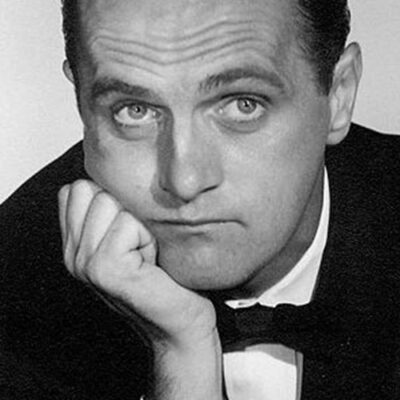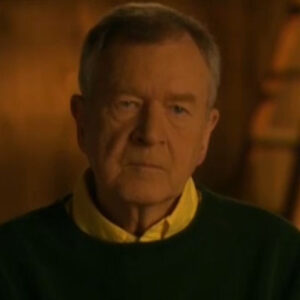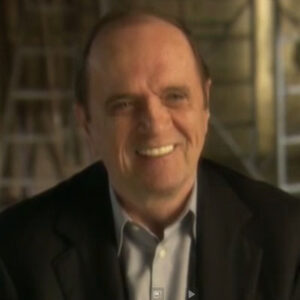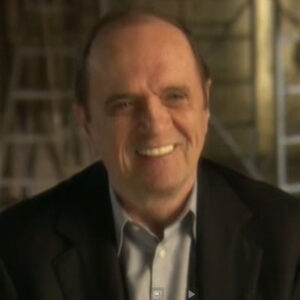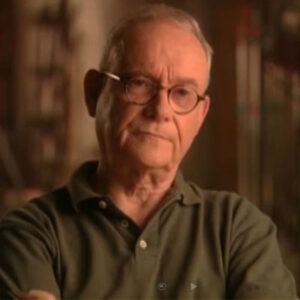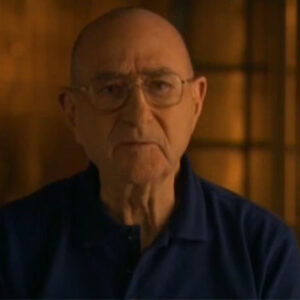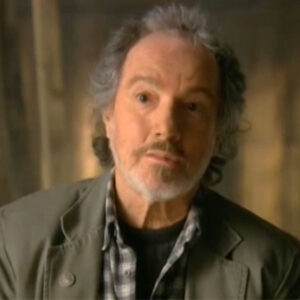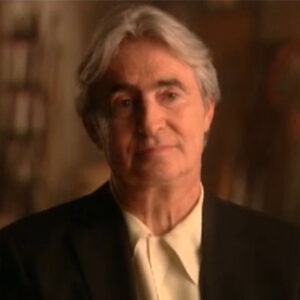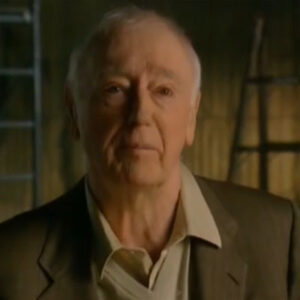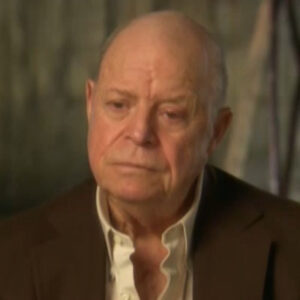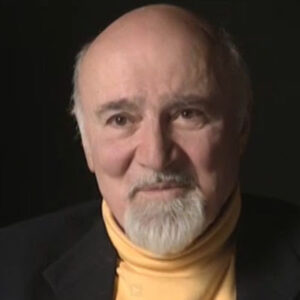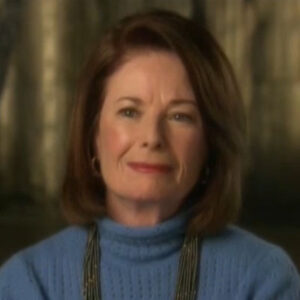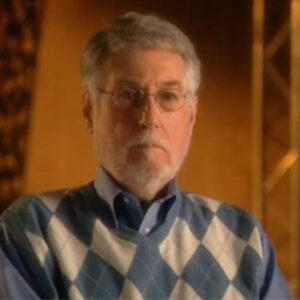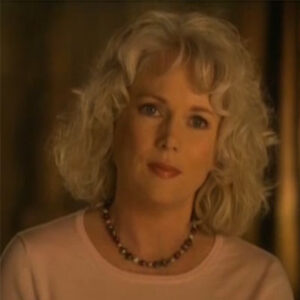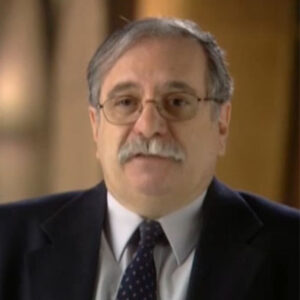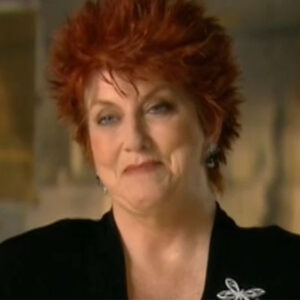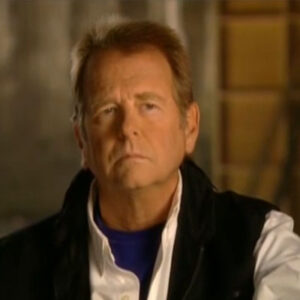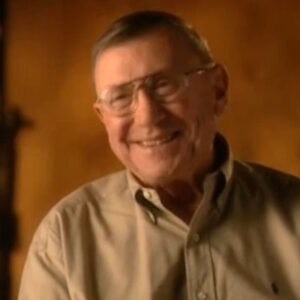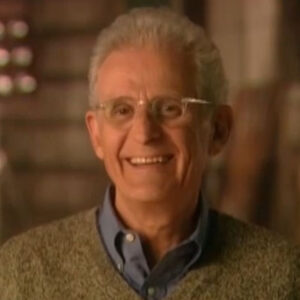Interviewer: So I want to talk one of the things I want to talk about in the show is how comedy was changing at the time. Bob kind of came in. So I wondered if first you could set up a little bit of comedy in the early 50s, what it was like if it was more joke telling and it was a little different than it became later on.
Larry Gelbart: Well, most comedians are. In the 30s, in the 40s, the part of the 50s were. For the most part, trained in Waterville, the kind of projection that the kind of education or lack of same. Probably first generation Americans. Not all of them either. As we what we who is comedy progressed. It stood to reason that the newer comedians would be that street smarter, more intellectual, better educated. And interested in more than just joke telling. Making a point. Making a social point. Making a political comment. And so. That’s the sharpest distinction, I think, between people even as brilliant as Jack Benny and Mike and Elaine.
Interviewer: So what? What was the sort of focus of the humor that with the Henny Youngman.
Larry Gelbart: Wait, wait. Yes. He followed me.
Interviewer: Loudest soundstage ever.
Larry Gelbart: Yes. They’re not prepared for Tonkinese. It’s quite clear.
Interviewer: What was the focus of the humor was for the sort of Henny Youngman types in the Catskill.
Larry Gelbart: Catskills. There was some character comedy. There were people who talked about themselves. But there were, you know, just sort of generic. My mother in law jokes and. Kind of naughty for that time jokes. A lot of the people came from burlesque as well, which was a bit more raucous. But what they all had and what they all share it even into the 50s was this tremendous sense of timing, this ability to be to work a crowd, to work for the approval of the crowd.
Interviewer: So what started to change in the late 50s with the arrival of some of, you know, the Bruces and the Burmans and people like that, what? What change in terms of the focus of comedy?
Larry Gelbart: It just became smarter. It just became more personal. Bob Hope there was no Bob Hope joke. You know, Bob Hope could tell a joke about anything. There was no character. In the joke, there was no essence of the man in the joke. He was like so many of his peers. A joke telling machine counting a lot on personality. Kind of a contract with the audience. I’m a funny guy. You’re here to see a funny guy. Let’s work. Let’s work together, you know? Not that the the new school we can qualify at the moment wasn’t after the same thing. The laugh. That’s the object of the game. But with that also imparting some wisdom, I think, of more Sahl, who was probably a latter day Will Rogers. But but the times got tougher and the jokes got tougher and more and more thought provoking. You didn’t just make. Again, general comments about how corrupt politicians are, how stupid they are, how Congress is this, how the president is that they were much more specific, more would work with the newspaper under his arm and he would be talking about the president, whoever he happened to be at that time. It was it was also a compliment to the audience. They were. They were. Giving you their assurance that they knew you were as smart as they were and. People like that, people like to be thought smart.
Interviewer: And who was can you talk a little about who was part of this new school?
Larry Gelbart: Well, certainly Nicholson May certainly Lenny Bruce, certainly, who died for everybody sins. Bob Newhart, of course, an oddity in that he was I think almost everybody with Dahmer was Jewish and Bob was kind of the the token gentile. Woody Allen for a little bit. Not not for long, but he was he was in it. He did try stand. He worked that standard very successfully. BERMAN The last first to future angry man. Who else? Who else helped me? The Smothers Brothers finally on television. I don’t. I wasn’t aware of them in the club world.
Interviewer: Can you talk a little about how Bob Newhart fit into that, both how he was part of that and yet how he was different from that?
Larry Gelbart: Well, comedy was kind of a boutique affair. You know, if you wanted political comedy, you you you would go to see in a club or buy an LP of a more saw if you wanted to, kind of kvetching, you know, complaining, whining comic. You went to see Shelby who complained about everything that you complained about. He was kind of the ombudsman for the disenfranchised, which is all of us. Bob had this kind of. Midwestern quiet. Almost unprofessional. Approach to comedy is kind of under the radar, you know, in an unexpected. There’s something about. The best comedians that you don’t really expect them to be comedians in this genre. I’m not talking about the the older style comics who, you know, all but were wore red noses, you know. Again, I think he was he was selecting. I just say an anecdote, you can use it whenever, whatever, whatever. I was present the night that Woody Allen made his standup debut in New York in a club called The Blue Angel, which was an Eastside, what we used to call. Nobody knew what a what was. I thought it was a. But that’s an Idaho and. Well, he worked very hard. He he he. The pattern, his speech. His rhythms, admittedly, I mean, I got this and what is not my idea, that he wanted to slugline me. He thought she was just the ideal. Sound, and, in fact, she is. And so he worked his first set at the Blue Angel. And I went up to his dressing room with my wife and I went to his dressing room. And Lee Mortimer, who was the nightclub critic for the Daily News in New York, had written his review a typed his review of Woody’s act and thrown Let the carbon behind. And when he picked up the carbon and he could read it, of course. And it said Woody Allen is a an intellectual Menasha Skolnick, which really sort of destroyed what he was just comic, was a Yiddish comedian. He was a very funny man, but distinctly unintellectual and distinctly Yiddish. And what he was kind of destroyed because he thought he was bringing this breath of fresh air and fresh insight into the theater. And what was at what was a nightclub critic to do but compare him to, you know, a prior school. I don’t know why that sticks in my mind, but it’s easily editable.
Interviewer: It’s interesting, though. I mean, I think about it. What about Bob’s influence that way?
Larry Gelbart: I don’t. I don’t know what Bob’s influences are, his influence. I mean, he’s he’s very droll. And there’s not been a lot of drollery in stand up comedy in America. It tends to be broader. All the working that way, he can be quite broad, but it’s under the it’s under the radar a bit. You know, I don’t know. I would be curious to know who his influences were. Does he say?
Interviewer: Yeah. Well, I wonder because he has some he’s a fan of some of the people you are anymore.
Larry Gelbart: Yes.
Interviewer: I dont know if you can. Can you see that in his work?
Larry Gelbart: I can see. I can see Laurel and Hardy in Bob. Instantly the put upon. He can be Laurel and Hardy. You know, he can be the exasperated Oliver Hardy who turns to the camera and goes. You believe this? Or he can pay the poor. So doing stand laurels. Like. He was. He was a he was the butt of every. Of every failed attempt to please Oliver or to please anybody. There’s a scale to do to Bob’s work. I you know, I can’t quantify it, but it’s it’s it’s small and it’s tight. And above all, it’s intelligent, you know, he never. He said while he does, the one thing A commands was, are there any surprises you and I have any. He cares about how he makes his points. I’ve heard tapes that he’s prepared for birthday parties of friends where he cannot attend, produced the kind of like little radio shows he will do. Wonderful. His own sound effects. I guess the big thing about Bob is you think he’s there to check the gas meter and he turns out to be one of the funniest people you’ve ever met. It’s this. This. Undercover, not not undercover. It’s. You just don’t expect it from you did expect comedy from a big fat guy with a tiny mustache and a little skinny guy next to him, and who’s his other influence, Benny? Well, Betty is, of course. Jack Benny really in my own terms of my own life. He really taught me how to play tennis. Not that I ever saw Benny Insurance or ever hitting a ball. But I remember when I first started to play tennis, I would think. Take your time. You know, run back for the ball. It’ll be there. Your racquet can hit it. But I remembered the patients that Benny had. Setting something up. Paying something off. And it’s a good life lesson. Let alone good, you know. Comedian lesson.
Interviewer: And you can see that in Bob?
Larry Gelbart: I can see that in Bob. Bob, Bob. As patients. A lot. A lot of comedians. The best of them. There’s no desperation in them. But there’s they want to get to it. They want to get to you. They want to. They want to. They want to win you quickly. I think he’s Bob is kind of this funny fungus who will allow himself to grow up for a while, you know?
Interviewer: So going back to that shift in comedy. Yes. Could we say. Would you say that was a comic revolutionof sorts or is it more subtle than that?.
Larry Gelbart: Well, I you if you can equate change with revolution. It was it was a revolution because but it was it was the handing of the torch. You know, it was it was generational for many for a few generations, the older crowd had held sway. The million barrels and the number of Jacky’s. Even Rodney Dangerfield, who was really under the radar, nobody knew he was working away there. It was it was the changing of the guard, not that the original guys lost any popularity or any money to the new guys, but there was a whole new field for a younger audience to appreciate.
Interviewer: And talk a little bit, if you would, about you. You wrote a book about the effect that radio and broadcast had. Comedy field. But what about the albums and particularly Bob’s albums? How they impacted?
Larry Gelbart: That plane follows me from interview to interview. I’m sure that. I’m sure they’re Nazis. The one thing Bob’s era introduced was the comedy record, the one meter, I think the man who did the JFK. Sold. Untold. Well, it was a told no. There was a huge number of records that was completely new. Being able to take the comedian home with you and listen. Not distracted by whatever distraction television is as much of a pet attraction as it is. And there are people who can to this day recite new Haaz routines. Nicholson Meinzer verbatim. Much as people walk around today doing Monty Python stuff to unsuspecting listeners. But that was that was a. A terrific way for a comedian to be known in a town in which he was not going to a pier for some time. It was as though the way he used to plug songs from the forthcoming Broadway shows so that by the time you went into the theater, you were whistling that tune. You know, you could go to a Newhart, having never seen it before and be prepared for his kind of comedy.
Interviewer: Did it bring comedy to people who wouldn’t normally go into the club, for example?
Larry Gelbart: I think so. I think people would have. There might be people who will have only heard the records and never went to a club. Just saying the word record sounds like we’re talking about Madam Curie or is a bygone age. Well, it is a bygone age. Yeah, and it was something you can keep. It was it was yours. It was your piece of that talent. And people had extensive collections.
Interviewer: Do you recall there was a Time magazine article, I think, in 1959? I think that talked about this new sickness. Can you explain what that what that was about and who they were and what they were referring to.
Larry Gelbart: When they talked about sickness I think they were talking about the new comic. who did a lot of complaining, did a lot of social commentary, which is complaining. All sounding like a, you know, a bunch of discontented idealists. You know, the world was not what they hoped it would be, and so they were always and the best people still do criticize how it is instead of how they wish it could be. I guess I guess they were considered sick because they talked about. They talked about subjects that were never there, were unknown to the early comedians. I mean, no one ever psychoanalysis was was unknown in this country for the first part of the century. And certainly no comedian would say he went to a. To a psychiatrist, you have to be crazy to do that. That would probably be the Joe. But this new group was very self-aware. And had another take on themselves and on members of the audience. Lenny Bruce was obviously probably the prince of the mix because he was the first to use for an up to twelve letter words in his act. Unfortunately, you know, in time, his his trials became his act and he really lost it. But I think they were talking about a less wholesome kind of comedy, but a more. There were more like investigative reporters, there were there were people who were talking about their own experiences, knowing full well that there were any number of people in the audience who shared those experiences or those feelings, those fears, those parents, whatever the jokes were.
Interviewer: Were you surprised that you see, Bob would be grouped into that?
Larry Gelbart: I don’t see. Bob is not a sickness to me. He’s an American nic. You know, I mean, there’s nothing sort of subversive that, yes, he’s subversive, but he’s not. He seems so homegrown. You know, he’s more Mayberry than. Then Mulberry Street, you know, he’s just he’s not urban. Anything but sicknic.
Interviewer: But I think he was grouped in that in some strange way. And I’m I’m sort of surprised by it as well. I can maybe, you know, if they’re thinking about the Abe Lincoln piece or I mean, he did have targets, though.
Larry Gelbart: Yeah, he had he didn’t have to. But, you know, I mean, what what what what are we about? It’s not generalities. You know, it’s very easy to lump all these people into one slick title.
Interviewer: If you would need you talk a little bit about his use of the telephone and that if you can explain. I know he wasn’t really the first, but why it worked so well for him.
Larry Gelbart: I think the first committee to use the telephone as a prop was George Jessel. Hello, Mama. Other people have used the telephone because it’s a it’s a great way of doing a two hander, a dialogue between two people as performed by one person. But again, I I think of Benny, I think of the fact that when you’re doing a telephone routine, there are those pauses. You say you you can’t do that right now, you know, and you sort of you’re forced to work. Benny ish. You’re forced to take those pauses while you’re listening to the imaginary voice, which. Is delightful for an audience because they’ve got a picture of the invisible speaker at the other end. I. I don’t think anyone’s done it since him, probably. They retired this telephone jersey. I mean, they know no one could do it as well, I guess, as Bob has, Bob.
Interviewer: So you could just say that.
Larry Gelbart: I think no one can. Can can perform with those imaginary phone calls better than Bob just because of his face or what is it because it works on the albums as well as on TV? Because it works on the albums as well as TV. Because it’s basically sound. It’s basically. You don’t need to imagine somebody on a telephone. You know, you don’t need to. And if his pictures on the cover, the album in it probably was, you know, what he looks like. There’s no production in it. It’s just a man and a receiver. And and so many of us have. The good old days when you were talking to human beings and not a machine, telling you that you can’t get to a human being. God, as I think about it, those pieces are antique now, you know, like wire wheels. I forgot how that started. And just as well.
Interviewer: What about. Bob’s career was pretty unusual in that he had the album came out, which was so huge, but before he’d ever played any nightclubs. And if you could just explain, I don’t think audiences today maybe realize how unusual that is.
Larry Gelbart: Well, in this, you know, new fast world, fast entertainment, you see a face on television. Well, before it might or might not well it before it becomes famous, you see a face. And so you have a vision of someone in the old days if you had an album. And I’ve never seen someone on television. I crashed I crashed? I was trying to get back to your question and I fell off my tongue.
Interviewer: I just I mean, most comedians worked their way up slogging through.
Larry Gelbart: Right.
Interviewer: The clubs. Right. And he kind of skipped over all that, which is just if we could explain how unusual that is to.
Larry Gelbart: Well, Bob was unusual in that he did not have a a huge following or probably any following at all. People who had seen him in various media. I don’t know, either in a nightclub or stage performance opening for someone, closing for someone. I’m not quite sure what he didn’t do. But most people knew him from from the records. And. Then it’s almost like going to a concert and hearing a singer do a song that you’ve heard. And by God, there it is. And he’s doing it. And I’m watching it. And I know this weather making him along with him. I can tell the jokes along with him. So he had this. Advanced build up with people who had never, never, ever seen him work.
Interviewer: And if you could also explain a little bit about TV at the time, how important? The Ed Sullivan Show was, for example.
Larry Gelbart: Yes. How many did he do?
Interviewer: I think he did about eight.
Larry Gelbart: Right.
Interviewer: Just don’t it again, how huge that was.
Larry Gelbart: OK. Ed Sullivan was a newspaper columnist in New York. And. I believe David Letterman does his shows now from the Ed Sullivan Theater. Ed Sullivan, his great talent. I guess you could think of him as a television personality. You would have to say he was a pointer. He pointed to the acts that he had booked for his show, which was a weekly Sunday ritual. You might not go to church, but you did watch Ed Sullivan at eight o’clock, I guess. And he had. It was a variety show. It was a waterfall show, a video vaudeville show in which people performed headliners unknown’s. Presley did his first appearance, I think, on television on that show. And he would introduce celebrities in the audience. I mean, just to sit in the audience was like a big gig, you know. And with us here tonight and so forth. And if you got to me, Ed Sullivan Show. It was like playing the palace in vaudeville. The palace being the goal of every aspiring vaudeville performer. And later, Johnny Carson’s show would would be that for comedians, if you got a shot on Johnny’s show. And then, of course, if he asked you over to the couch, you know, you probably could avoid being on a psychiatrist couch for the next 20 years. And so to score on The Sullivan Show was a major, major victory and milestone in your career, steppingstone in your career. And he was a he was a tough guy to work with. Sullivan was because he might tell you at the last second cut three minutes, you know, of your three and a half minute act or I don’t want you to do that. I don’t want to do that. It was it was kind of cavemen television, you know. And that, of course, was an enormous boost for for Bob appearing on that show. But, you know, he’s always surprise. He’s always surprising people. I mean, I don’t know if you can talk about it, but the movie career. And a television career we’re getting somewhere.
Interviewer: We’re moving, moving through.
Larry Gelbart: Yes, are we at the 60s.
Interviewer: Yes, we are. I was going to ask you just quickly. I don’t know if you are familiar with his early variety show. I’ve had a variety show.
Larry Gelbart: No.
Interviewer: No. We’ll just.
Larry Gelbart: OK.
Interviewer: One thing before we I just wanted to mention about the you mentioned that Lenny Bruce and all the foreign twelve letter words as opposed to Newhart is talk about having a clean act and how is that harder even and the fact that he has maintained it all these years.
Larry Gelbart: Well, the only guy who worked blue. That was the expression blue comedy. Was Lenny Bruce, no one else dared to do the kind of stuff that Lenny Bruce. I saw Lenny Bruce working in the in the San Fernando Valley in just over there in L.A.. One hundred and fifty years ago, I was at a nightclub called Oilcan Charlie’s, and it was not the Lenny Bruce we came to know. And some people came to fear. It was only Booza came out and said, Good evening, ladies and germs. I mean, he really was trying to make it as a very primitive standard kind of standup. He later went on to this personal, really tough comedy. Almost, that means it doesn’t mean. But it sort of trivializes it by calling it comedy because it was comedy, but it was so. Perceptive and so biting and challenging and daring that it almost transcended the form. He did transcend the form. That’s why he got so much trouble. Because, you know, often scouts, Army Scouts will get killed first because they’re in their own territory. They shouldn’t be in. So that everybody word clean. Bob was squeaky clean.
Interviewer: But the fact that he . Just what we were just talking about. In fact, in some ways, harder to keep a clean act.
Larry Gelbart: Well, it’s hard to because you really have to earn the laughs. You can’t.
Interviewer: If you can say that.
Larry Gelbart: It’s it’s it’s it’s harder. It’s easy to get laughs by using. By big by being profane, because first there’s the shock. There are people who are laughing now because what you said is funny, but because you said it and they’re they’re embarrassed. And so you get a titter, if I may use the word, in this context. And whereas if you were clean, you may have to make a point to to earn that laugh. And as far as I know, Bob has always maintained this kind of zone sanitary. You know, I know that he’s not a goody two shoes and it doesn’t lessen the impact of his comedy, but he just relies on being explicit without using explicit language.
Larry Gelbart: Talk about him as a writer. I mean, he wrote all those early. You’re a writer. I’m sure you. I have an opinion on his views on his writing.
Larry Gelbart: Well, as a writer, I until this moment, I didn’t really think about the fact that he wrote those early routines and he’s a wonderful writer. Obviously, we’re having we’re doing a tribute to him.
Interviewer: But who do you think I mean, particularly? It seems like he came up with a lot of great premises. A lot of his humor comes out of his own premises as well as any good writer.
Larry Gelbart: He’s he’s an observer and he’s he’s sometimes you can just reportage. It can be the best kind of satire. Just get it right. Just get what’s happening. Right. Just get what’s happened to you that, you know, happened to somebody else. Write that faithfully and you’ve written something very good indeed. And then he had the extra ability to do it as a comedian. That will be him anyway.
Interviewer: You had a great line in that book. I think journalists, comedians are like journalists of human truth. And I wondered if that applies to to Bob as well.
Larry Gelbart: Well, Bob, more than most comedians, is kind of a foreign correspondent or just a correspondent. Reporting on our own behavior. Reminding us of situations in which we were vexed or or or perplexed. I’m going to try to avoid rhyming the next word. He just kind of plays your life back at you. In a way that you recognize and and and just enjoy very much. He’s smart, he’s taken he’s taken the tiniest things and made them as important as we sometimes make tiny things.
Interviewer: So let’s jump up to the 70s.
Larry Gelbart: Moving right along.
Interviewer: If you could talk a little bit about what was happening in TV in the 70s and perhaps how Bob’s show, The Bob Newhart Show fit into that, then maybe reflected that.
Larry Gelbart: The 70s, I think, was a unique time for television. Unlike the early days, there was actually no drama on television. Television began with very important writers of Paddy Chayefsky, Reggie Rose, J.P. Miller, a host of people who were writing. About our lives, not about doctors, lawyers, cowboys, Indians. Cops and robbers. Lawyers say lawyers. That’s okay. It’s a firm lawyer and lawyer. So it fell to the for some reason in the 70s for no reason, and the reason was All in the Family, which was based on a British series. Cult of death us do part. And those were the shows that we’re talking about, people’s lives, social issues and. Carrying the ball, because, as I said, there was no drama. And The Newhart Show was one of those that in its own approach was talking about. Life as people knew it, not as Harriet and Ozzie Nelson knew it or even Lucy knew it.
Interviewer: And was it the fact that the character was psychologist? Did that also kind of speak to the 70s in a way.
Larry Gelbart: The fact that Bob was a psychologist I think had a great deal to do with the the the proper time. The fact that that that that Bob was a psychologist let him get into areas that were comic and identifiable to some of the people who might have might not have thought that their particularly conditions weren’t comic. But there again, it was mirroring mirroring life rather than show business.
Interviewer: And was it was it was comedy change, because I think if you can tell us a little bit what was on up till then, it was like what The Munsters and all these kind of crazy things. And then comedy was becoming maybe more adult or.
Larry Gelbart: It became urbanized. For one thing, comedy, the most popular shows with things like Petticoat Junction, Beverly Hillbillies, Greenacres. And somebody decided to chop down all those trees and put some brownstones up, you know? So you got all in the family, you got Mary Tyler Moore, you got Nouhad MASH, I think could be included in that in that group of shows that. That had people behind them. I’m talking about writers primarily. That knew how to be funny, but we’re more citizens of the world in a way, they were again, better educated. I don’t think as well-educated as the current crop of television writers, producers, etc, but. People who are ready to tackle. Big subjects, serious subjects and and and called the pill.
Interviewer: Bob Newhart Show clearly was not as topical as mashers, some of the other ones. But in its own way, was it, you know, addressing some of these issues suddenly?
Larry Gelbart: Well, just you just if Bob was the only Bob was, I believe, the only show there was Handly, there was there was headed by a psychologist who was talking about people’s illnesses down to Quirk’s, down to foibles. But and they never had, you know, serial killers coming in for. Treatment. But in that way. People don’t know to this day, oh, they probably know more now what is a psychologist, what is a psychiatrist or, you know, is it OK to go to a therapist? So in that way, it broke that wall down a little bit and made made you feel that you don’t have to be crazy to to need help. You just had to be human.
Interviewer: And was it groundbreaking in any way, in your opinion? Also in the way it looked at the relationship of that couple? They seemed very different than, as you say, Ozzie and Harriet.
Larry Gelbart: Well, the real groundbreaker for the behavior merit marital behavior was Dick Van Dyke. I mean, these people actually look like they went to bed together and didn’t just talk, you know, all night long about. What they were talking about, instead of doing whatever it is many people do and Bob carried on in that tradition, I think, you know, it was a much, much, much more honest look at how two people. Doomed in the scheme, which could could, could, could. You do get along. I don’t get along,.
Interviewer: But he did take it a step further because you look back at Dick Van Dyke, they were still in.
Larry Gelbart: Yes. And Dick Van Dyke stays. The mayor, the man and the woman still had to be in twin beds. That’s that’s a carryover from the Hays office days of motion pictures when you could show a man and woman in a in a single bed. But one of their one of the participants had to have one foot on the floor. I tried that once. It’s impossible.
Interviewer: And so was was the Bob Newhart Show sort of, you know, pushing that?
Larry Gelbart: I don’t really I don’t I can’t answer that. I don’t know whether it pushed it truly.
Interviewer: You can talk about that Saturday night lineup, because, again, in the days of TiVo, people don’t realize how big that was, what it what it was.
Larry Gelbart: What was the Saturday night lineup?
Speaker I think it was a family mash. Mary Tyler Moore, Bob Newhart Show. Carol Burnett Show.
Larry Gelbart: Wow. I wish I remembered it. Well. It really now, looking back, although was exciting then to be part of that lineup, to be on the family mash. Newhart care. Mary Tyler Moore and Carol Burnett all in one night. I mean, why would anybody go anywhere on a Saturday? It was packed. It was packed. And when you think about it, the variety, you know, maybe talking about abortion on one show, circumcision. Just flat out wonderful variety, as in Carol’s case. A career woman, which we’ve not had and a psychologist. I mean, that’s that’s a good lineup.
Interviewer: And people literally did stay home.
Larry Gelbart: Yes, you did say. Well, I mean, what what what movie, where you’re going gonna go see or what restaurant, where you’re going gonna dine. That could give you that. That complete a bill of fare of entertainment, and it was. Around that time, you could record a show on VHS and watch it, but there wasn’t a widely used practice. And for a while you could only do it in black and white. There was no TiVo, of course. It was just TV. So if you missed it, you missed it and you’d had to you’d have to hear about it the next morning. Well, not the next morning. I don’t think many churches have a watercooler, but you’d have to hear about it or you’d have to wait for a rerun, which might be six months from then. So it was worth staying home for that.
Interviewer: Window two was was Bob. Pretty original in that he went from being a stand up comic to a sitcom star, which is so. Par for the course today. In a way, but it wasn’t fun, isn’t right?
Interviewer: No, it is it is considered a an asset. Now, if you come to television with these stand up comic background because you’re bringing some kind of character or characteristics to the table and you can build a show around someone’s above, it was unusual. And Bob’s in Bob’s day. In fact, if you if you think about that particular lineup that we just talked about, no one and no one on all of the family is completely staffed by stage actors and motion picture actors, as was MASH, as was Mary Tyler Moore, as was Carol. I mean, Bob was the only guy who went from being a sound to a face, to being a full blooded character rather than a monologist and to.
Interviewer: Why does that work and why? You know, it obviously led to people. Finding that a successful formula, what it is about that.
Larry Gelbart: It worked because they like Bob, they like. But, you know, unlike. Unlike almost any other medium television. Throws off. Did the audience makes a television star. They really feel that they’ve found the person that they like, him or her, that they want him or her around a lot. And that’s what I meant. Bob, Bob. Maybe Bob earned his place. He happened to be. He happened to be able to project physically what he was doing. Aurally. And so he clicked. He’s smart, he’s a good editor, you know. I don’t think there’s any comedian. That ever made it? That wasn’t a good editor. They didn’t know exactly what he or she could do and should do. Not that they weren’t bold. Not that they wouldn’t try other things. But they knew in their bones what was right for them. And he certainly has demonstrated that.
Interviewer: And do you think that. That he had to learn to act or do you think? You know, obviously he wasn’t an actor coming in. And yet it still worked. And why do you think he was acting in his stage routines already in a way or.
Larry Gelbart: I never notice Bob being different off camera than he is on camera. I don’t think he compartmentalizes. I don’t think there’s Bob the actor. And Bob the Bob. I think Bob is smart enough. The best acting is behavior anyway. It’s not acting. And he was just being. Very true to himself. I think that’s not to say that there were certain situations where he didn’t have to feign surprise when he wasn’t surprised or. Or another sterling example. But. I guess I don’t know enough about him to know whether or not even the Bob he shows us is the real Bob, whether this is not, in fact, some standup.
Interviewer: Yeah, I actually I should. Is that does he seem the exception to the rule that most comics, you know, are fueled by pain or.
Larry Gelbart: I don’t think most comics are fueled by pain. I think most of many of them are fueled by anger. Which can be painful to watch. No, it’s just it just is his key. The key that Bob is written. You know. I think he’s as angry about stuff as anybody. I think he’s just pained. But I don’t think. I think he finds life silly, amusing, maybe even heroic now and then, I don’t know. But. It doesn’t strike me that his pain.
Interviewer: What about. Are you familiar much with his series after that, Newhart?
Larry Gelbart: No, except that I had the best. I didn’t know that much about the second story. But I do know that it had the best final moment of any series ever and as ever apt to have.
Interviewer: Did you watch it?
Larry Gelbart: I did watch it. I want to I’m sorry. I, I yes. I guess I’m sort of a television funeral goer. I always try to get to the last show.
Interviewer: Yes. Let’s say that again.Almost done.
Larry Gelbart: OK.
Interviewer: This is great though.
Larry Gelbart: OK. I wasn’t a regular watcher of the second series. I’m not a regular watcher of any series. To be truthful. But I guess I’m kind of a. A funeral goer, when it comes to television, I want to be there for the last rites of any show. And so I did watch that show and. Far too many decades in this business. I’m pretty surprised proof, but I almost fell out of my chair when that. Last seen occurred and Suzanne was lying there in bed. And it was just an astonishing, surprising, wonderful, unbeatable finish. And whoever thought of it should get a raise retroactively.
Interviewer: Actually, Bob says it’s his wife.
Larry Gelbart: Really? Well, then you should give her a raise.
Interviewer: Quickly, I don’t know if he had a Ttwo other attempts at series after that. That obviously didn’t go. And I wondered if you could talk a little bit about what was happening in TV comedy then. Maybe. Perhaps. Bob style didn’t work anymore.
Larry Gelbart: When was it?
Interviewer: It was in 90. Early 90s.
Larry Gelbart: Well, television has changed so much since Bob’s two series, that magical lineup. We talked about television like so much in America now. Not just the arts. War and peace is corporate driven. No one has the freedom that they once had to do a show that they want to do. There are. Just so many. There’s just so much intrusion and micro managerial behavior going on that it’s almost impossible to do the kind of thing Bob did. Things popped in and some of some of the rest of us did. I think he’s he’s not only lucky, but he’s exceptional in that he had to. Dynamite series. And I don’t think he’s interested in resting on his laurels. But. Those would be very comfortable to rest on.
Interviewer: And you mentioned I did want to ask you about his movie career a little bit. I don’t know if there are any favorites.
Larry Gelbart: Well, again, very quietly. He’s had this, you know, ongoing career in films, unheralded. He was in that huge hit last year, Elf. He just shows up in odd places and does what only he can do. It must be a great comfort to him to know that, you know, anytime he feels like it, he can pick out a medium, go there and do very well in it and go back to wherever he goes, which is where he starts from when he travels out to these other media. So when you think about it from. From records, from standup, from radio. From. Television. Motion pictures for a quiet guy. He’s at a very noisy career.
Interviewer: Do you remember him in catch 22?
Larry Gelbart: I’m probably one of the few people in this world that never saw catch 22. No, I haven’t. I don’t know why I I resisted it all these years.
Interviewer: Do you think you talk? Is there his movie career was never quite the level of his TV career. Right. Do you think there is a reason for that? He works better in one medium than the other?
Larry Gelbart: Well, it is his movie career is not as. Prominent as is television. It’s because he’s a character, person and character. People don’t tend to be. I think America is only interested in leading men and leading ladies. And you can have a good career, but you can never have a very flashy one in pictures. I think that’s Bob’s. God, I’m finding myself saying something negative, you need a divining rubbers. Find something negative to say about Bob Newhart.
Interviewer: But do you think it’s also the way? I mean, like you said before, that he worked so small and maybe TV is so much better for that?
Larry Gelbart: No, I think he I think he knows how to fill up a screen, whatever the size. Managed to, Candy, not to be able to know I have to give a screen performance, but with that it still it is small and small. Small is the wrong word. The scale is different. But I don’t think it’s because he’s any of the above. I think it’s because. He’s always in support of somebody in a motion picture, and that’s no way to become a star. You know, in movies.
Interviewer: That’s true, thank you.

